"L. P. Lovee", which is coined from "Let's practice LOVE everyone", is the pen name of Satoshi Kinoshita.
(Year-end・New Year, Winter)
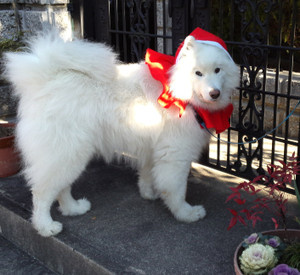
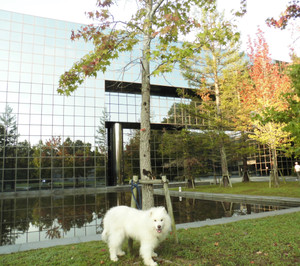
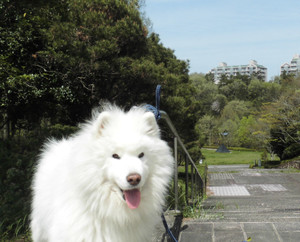
年用意犬のシャンプー先づ済ませ
(toshi-yōi inu-no-shanpu mazu-sumase)
shampooing of my dog
comes first_
preparation for New Year
純白のサモエド犬に初朝日
(junpaku-no samoedoken-ni hatsu-asahi)
the New Year’s sun rises,
shining on the pure white
of the Samoyed dog
我もまた犬馬鹿となり去年今年
(ware-mo-mata inubaka-to-nari kozokotoshi)
another dog-fool
me too,
New Year's days
初遊び孫の飛行機犬追ひて
(hatsu-asobi mago-no-hikōki inu-oite)
the first play of New Year_
our dog chasing
an origami plane of grandchild
家族とて犬も一椀七日粥
(kazoku-tote inu-mo-ichiwan nanukagayu)
a bowl of New Year porridge
to the dog
as a family member
牡蠣鍋や犬はふて寝の背を向けて
(kakinabe-ya inu-wa-futene-no se-o-mukete)
the table pot oyster meal_
the neglected dog,
looking away in the sulks
愛犬の舐めゐる器初氷
the season’s first ice_
the bowl
licked by the dog
愛犬の糞も寒肥庭手入れ
excrements of our dog
used as fertilizer_
gardening of midwinter
風花や犬はソナタにすやすやと
the sunshine snow-flakes_
the dog in sound slumber
listening to a sonata
雪しまき故郷恋ふかにサモエド犬
the blowing snow_
the Samoyed dog
longing for native home
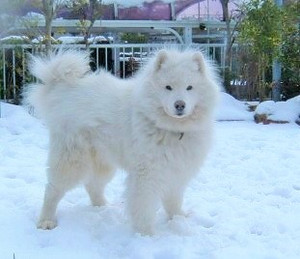

(春: Spring)
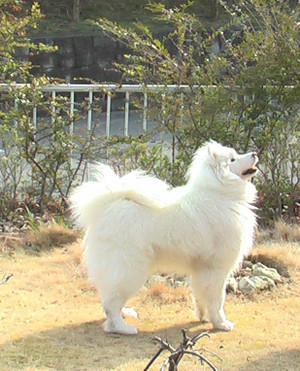
残雪を食みて飽かざるサモエド犬
the Samoyed dog
tirelessly
devours the remaining snow
春めくや犬と行く丘町眼下
the springlike weather_
a walk with my dog
the hill overlooking the town
木の芽晴れ犬を侍らせ庭手入れ
a leaf-budding clear day_
I tended my garden plants
with my dog lying beside me
四温晴れ愛犬庭に大仰臥
warm clear day after cold one_
my beloved dog lies supine
with legs wide spread
のどけしや犬の遠吠え鴉の音
serene weather!
a dog howling in the distance
a crow is cawing
犬舐めし童の破顔春うらら
licked by the beloved dog,
a child grins with joy_
the bright spring day
初蝶来犬寝そべりて目で追ひぬ
the first butterfly of the year_
the sprawling dog
chases with eyes only
愛犬の馴染みの土手や犬ふぐり
tiny flowers of weeds
looking like scrota of a dog_
the bank favored by the dog
サモエドの尻振る闊歩麗らけし
Samoyed dog leisurely strides_
buoyant wagging of the tail
like the springtime
・長閑けしや仰臥の犬の恍惚と
balmy!
the dog lying supine
the spring-like weather
チュヌの写真
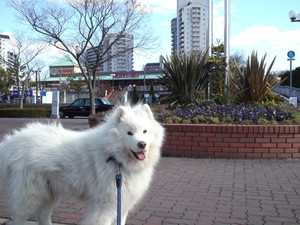
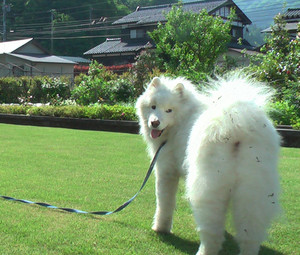
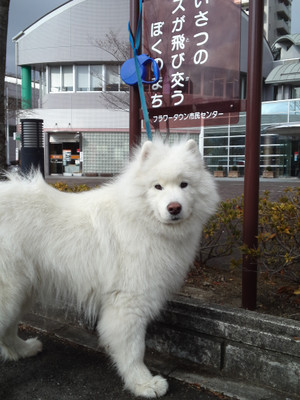
(夏: Summer)
・愛犬の大舌だらり夕薄暑
dangling the long tongue
my beloved dog_
the early summer evening heat
・薄暑急愛犬遂にダウンせり
too soon the hot weather_
alas!
my beloved dog has collapsed
・黒南風の雨を厭はず犬散歩
my dog willing to walk_
in spite of windy rain
before the rainy season
・犬小屋の日除けのゴーヤ伸び早し
bines of balsam pear
grow fast
for sunshade of a doghouse.
・節電の炎日続き犬喘ぐ
the dog pants
a spell of hot weather
in power-saving days
・遠雷や眠りし犬は耳ピクリ
a distant thunder
the sleeping dog
twitches the ears
・雷間近猛りし犬のけたたまし
a thunderbolt close at hand
the dog
furiously barks
(秋: Autumn)

・股関節外れし犬や秋暑し
my dog suffers from
dislocation of a hip joint_
the hot autumn day
・病癒え新涼の庭駆ける犬
recovered from pancreatitis
the beloved dog runs
the garden of early autumn
・飛ぶ帽子犬と猛追野分前
dog and me
frantically chase the blown-off hat
on a pre-typhoon walk
・サモエド犬駆け行く背ナにこぼれ萩
petals of Japanese bush clover
on the white back of
the running Samoyed
・満面に草の実つけしサモエド犬
how cute my Samoyed!
the whole face
with weed-seeds clinging
・健啖の犬貪れり落銀杏
a hearty appetite_
my dog devours
fallen ginkgoes
・木瓜の実の玉蹴り犬は食み食みつ
the dog bites and eats
a quince ball
at every my kicking
・小気味よく犬と踏み行く落葉道
the path covered with fallen leaves
the dog and me
delightfully treading on
・サモエドの寝顔くすぐり紅葉散る
a red leave falls
and tickles
an ear of the sleeping dog
・まっしぐら 犬目指す先 熟柿落つ
a ripe persimmon fell,
my dog dashed
for it
チュヌは熟柿が気が落ちる場所を覚えていて、そこに近づくと駈け出しました。
青色文字の「俳句」や「HAIKU」をタップすると、それぞれ最新の「俳句(和文)」や「英語俳句」の記事をご覧になれます。









